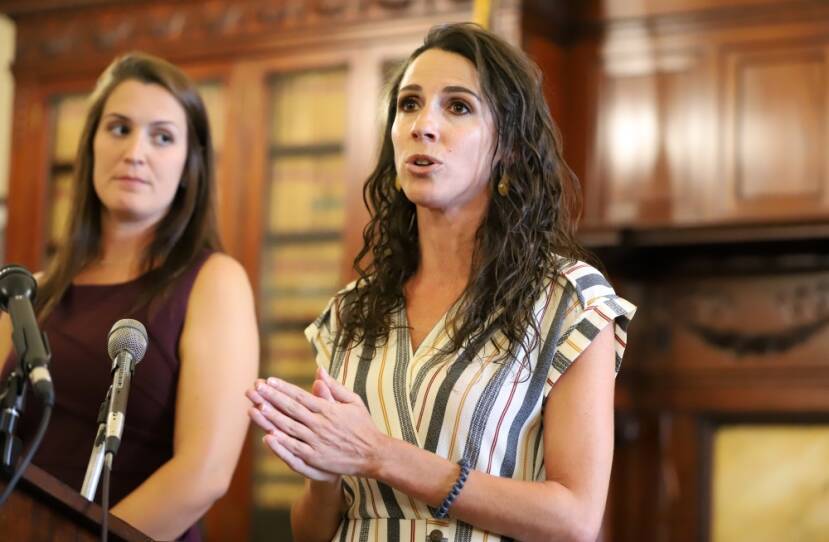The statewide elections in Massachusetts last week ushered in some notable changes in the state's legal landscape. GBH News legal analyst and Northeastern law professor Daniel Medwed joined Morning Edition co-hosts Paris Alston and Jeremy Siegel to talk about them. This transcript has been lightly edited.
Paris Alston: Daniel, Donald Trump's influence wasn't really at issue on the ballot here in Massachusetts, even though it was definitely a feature on the national stage. But do you think that any of the outcomes on the broader stage reflect or hearken back to the Trump factor, the influence that it can have on some of these more local and national races?
More Politics
Daniel Medwed: I do. I think on a micro level, the Bristol County Sheriff's race reflects some of those macro level feelings about the waning influence of Trumpism. And here's why: The incumbent in Bristol, Tom Hodgson, is an avid Trump supporter and a polarizing figure, to say the least. He's been accused of fomenting inhumane conditions in the Bristol County Jail. A number of other controversies have arisen during his watch. And despite the power of incumbency and the peculiar political makeup of Bristol — this is a county that went 43% for Trump back in 2020, the highest rate of any county in the Commonwealth. Despite those advantages, Hodgson lost. Yes, it was a nail-biter, but he still lost to the Democratic challenger, Paul Heroux, for sheriff. So I think if any race in the Commonwealth reflects that larger trend, it was probably that one.
Jeremy Siegel: Okay, let's shift to the statewide races last week. There wasn't much suspense surrounding some of the big-ticket elections, like attorney general, gubernatorial, lieutenant governor. But what about some of the more under the radar races, anything grab your attention in terms of how it might affect legal issues in the future in the Commonwealth?
Medwed: Well, the state auditor's race was really intriguing and that's not something I would have said a couple of weeks ago. The Democrat, Diana DiZoglio, just edged out a moderate Republican, Anthony Amore, who I think was the only candidate backed by Governor Charlie Baker during this cycle. And I think this race is pretty notable for a couple of reasons. First, although that office traditionally is quite sleepy, the state auditor's office, which of course audits state agencies and makes sure that public funding is being allocated and used properly, DiZoglio has grand designs on the office, a very ambitious, progressive agenda.
She wants to enhance transparency of public agencies, conduct a thorough safety review of the MBTA, which I know is something that, Paris and Jeremy, is of interest to you guys. And she also wants to take a deep dive into equity and inclusion issues with regard to the allocation of recreational marijuana business licenses, which is also a really critical issue.
Second, the circumstances surrounding the race, sort of the last-minute twists and turns, I think were astonishing. So many people received a barrage of last minute text messages from an anonymous source claiming that DiZoglio was opposed to the LGBTQ community, that she had backed a conversion therapy, a very controversial and discredited measure that suggests that gay people can be converted into straight. And I got one of those messages. I don't know if you two got it, but it certainly sent me spinning and forced me to take a deeper dive into this race than I originally thought.
Alston: Yes, Daniel, I did get one of those text messages as well. I was like, Who is this texting my phone? I don't know what's going on.
Siegel: Yeah, I didn't get that specific one, but I did get like a ton of texts about this specific race and nothing else. It was weird.
Alston: Right at the last minute there. So to follow up on that, could the person or the entity who did end up sending those or being liable for those texts be liable for, say, damages to DiZoglio?

Medwed: You know, in theory, Paris, it could be a form of defamation, which is a tort lawsuit in the Commonwealth. And there are two main types of defamation. Libel is when there's a written statement that's untruthful and harmful to the reputation of someone else. Slander is the oral statement form of that. In Massachusetts, you have three years after the appearance of the statement in which to file your defamation action. So DiZoglio doesn't have to make a decision today.
She has a couple of years to figure this out. On the one hand, it would seem as though she has a credible, substantive claim here, because these text messages were a grave mischaracterization of her stance. She was once affiliated with an evangelical church that espoused controversial views about conversion therapy. But she's long since distanced herself from that church and disavowed those beliefs. On the other hand, because she's a public figure and we tolerate a lot of commentary about public figures, it's a very high standard to prove defamation in this context. She would have to prove actual malice on the part of the entity or person behind these text messages. And that might be a really high hurdle to clear.
Siegel: I want to talk a little bit about ballot questions, specifically, Question 1, the so-called millionaire's tax, which passed by several percentage points. That's significant for a number of reasons, among them, the fact that similar efforts have failed in the past. What made it so hard for supporters to get this one on the ballot in the first place?
Medwed: The concept of a flat tax is ingrained in our state constitution. That's why we get taxed at the same rate, 5%, regardless of our income level. Most states, and, of course, the federal government have a progressive or graduated income tax. But here in the Commonwealth, it's a flat tax. And because it's part of the state constitution, there's not a simple fix. You can't just repeal the law.
So in the past, advocates of the millionaire's tax went down a special route that's designed to amend the Constitution. It's called the Citizen Petition Initiative Path, where you cobble together a bunch of citizens signatures, get the attorney general's office to certify the question, garner some modest legislative support, and you get the ballot initiative on the ballot.
The glitch with this approach is you're subject to what's called Article 48 of the state constitution, which says that ballot questions can't contain independent questions. There's a concern about voter confusion if there are too many subparts to a ballot question. So back in 2018, the SJC cited Article 48 to say, hey, the millionaire's tax has too many complicated questions in it: first, whether we should even have a millionaire's tax; and second, how the revenue from that tax should be allocated. So that's why it failed in the past.










